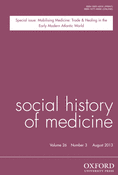-
Views
-
Cite
Cite
Norman Smith, Hans Derks, History of the Opium Problem: The Assault on the East, ca. 1600–1950, Social History of Medicine, Volume 26, Issue 3, August 2013, Pages 584–585, https://doi.org/10.1093/shm/hkt023
Close - Share Icon Share
Extract
In History of the Opium Problem, Hans Derks describes and analyses the history of the ‘Opium Problem’—from its first emergence in the 1600s to 1950, as opium was transformed into a luxury item, a mass product and a defining element of imperialist aggression (p. 47). The book traces that history in seven parts: ‘The Opium Problem’; ‘British Assault’; ‘Dutch Assault’; ‘French Assault’; ‘New Imperialists’; ‘Victims’; and ‘Story of the Snake and its Tail’. Parts Two to Six contain valuable ‘Reflections’ sections that reiterate Derks' assertion that the opium assault on and in ‘the East’ was essential to the imperialist, state-sponsored ambitions of the Portuguese, English, French, Japanese and American states. The Dutch assault, a fascinating and important case study of more than 200 pages (perhaps the strongest contribution of the volume), is argued to have been the worst, by setting precedents for subsequent imperialist doping of Asian populations.
Derks makes a strong case that the Opium Problem arose as a result of Western imperialism and colonialism in Asia, and advocates closely questioning ‘the role of the state which hides itself in the West behind dubious Christian morality and policing … a state which acts, once out of the sight of its citizens, in (neo) colonies, as the worst violator of everything it stands for at home’ (p. 730). This statement reflects much of the tone and content of the volume. Derks stresses that his findings are ‘not a result of some ideological standpoint, but simply a consequence of proper historical and political-economic research’ (p. xiii). However, the writing at times suggests otherwise, especially in his stressing the ‘undeniable guilt of Western governments from the 16th-century onwards’ that he argues is obvious after ‘even a superficial’ consideration of the Opium Problem (p. 5). Further, Derks argues that such state complicity has been systematically downplayed, dismissed or silenced in received scholarship. Through the study, he joins ‘a criminal State and illicit Capital’ in colonial conspiracies under the banner of Free Trade, which he dismisses as no more than ‘a monopoly of violence’ (p. 123). Derks closes the volume as the snake eats its tail, with the Western imperialists plagued by drug problems brought home.




